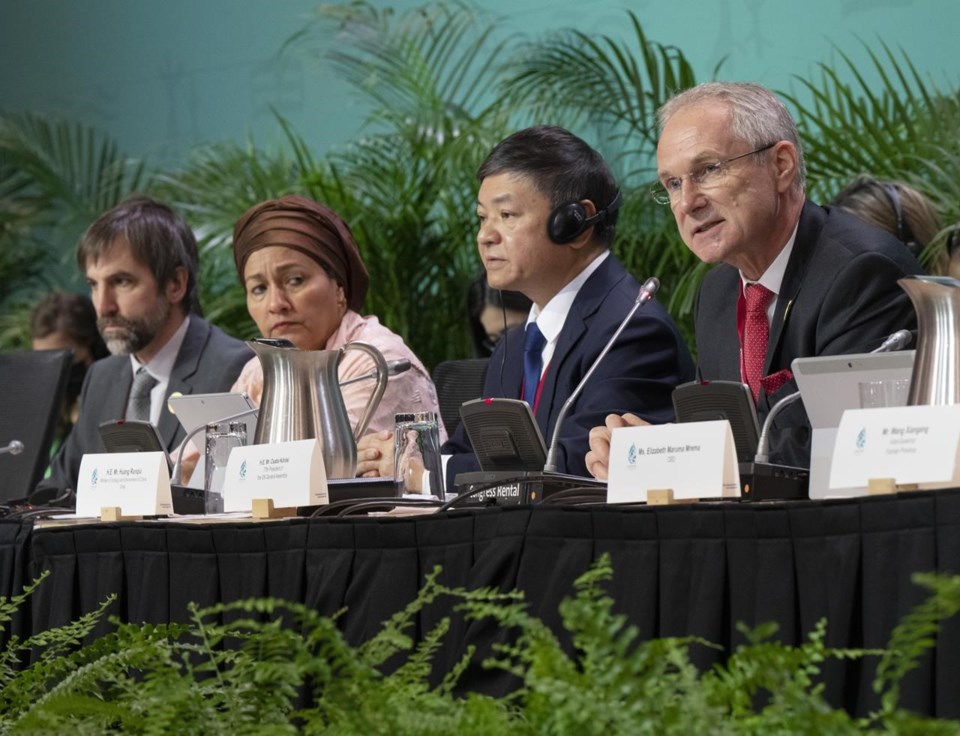MONTREAL — The Canadian government is promising another $255 million in nature conservation financing for developing countries as the impasse over funding at the COP15 nature talks in Montreal drags into the final weekend of negotiations.
Environment Minister Steven Guilbeault and Foreign Affairs Minister Mélanie Joly announced the latest funding Friday afternoon on the sidelines of COP15, where most countries in the world are trying to reach a deal to halt the destruction of nature and restore what has already been lost.
"You have heard, just like I did for the last few days, from several developing countries that the question of mobilizing resources is an important challenge and an important issue at stake for this conference," Guilbeault said in French.
"We have underlined the fact that we have heard that call."
With the meeting scheduled to end on Monday, an agreement between the 196 member nations of the UN biodiversity convention remains elusive.
Developed nations want developing countries to agree to their marquee target to conserve 30 per cent of the world's land and marine areas by 2030, while developing nations want better financing.
Lord Zac Goldsmith, the U.K. minister for international environment and climate, said Friday both sides have to make a move.
"We can't unlock ambition but we're not going to have enough finance without ambition either," he said.
Developed countries feel strongly they have moved, adding more money in the last two days.
Canada's $255-million commitment comes on top of $350 million announced Dec. 6 and $1 billion promised in 2021, to be delivered over five years. The U.K. Thursday added the equivalent of about C$48 million and Japan promised $1.2 billion.
The Nature Conservancy, a U.S.-based global environment organization, said in 2019 the world spent between $170 million and $196 million on activities that benefited nature. It said that's nearly three times what was spent in 2012, but estimates truly protecting biodiversity, will cost nearly $1 trillion every year.
For developed countries, it's not just the amount at stake, it's how it is delivered.
Most of the new Canadian funding is going to the Global Environment Fund, a 30-year-old investment fund that supports environmental projects including climate mitigation, adaptation and nature conservation.
Developing countries say it has become difficult to access.
"GEF is not adequate, and its provisions and demands are increasing," said Flora Mokgohloa, the deputy director general for biodiversity and conservation in South Africa.
She said there has been no real change in the standoff.
"We're not hearing what the other side is offering, really," she said. "And what the other side has said to us is what has always been there, and that has not worked and we have not met the right targets."
But developed nations, led by the European Union, have made clear a new model was not in the cards.
"What's extremely important is that there is no new fund," said Virginijus Sinkevicus, environment commissioner at the European Commission.
He said it took nearly eight years to negotiate the Global Environment Fund, and creating a new fund rather than focusing on improving the efficiency and effectiveness of the current one would cause delays.
"So those talks about the new fund, I think they're only misleading, they're not delivering any value so far," he said.
European media also reported Thursday that French President Emmanuel Macron wrote to the EU to say that a new fund was a "red line" for France.
Canada's position has been less adamant, though Guilbeault has said he prefers to use existing funds. Still, the decision to channel $219 million of Friday's $255-million contribution to the GEF sends a statement in and of itself.
There is work underway to improve the fund's efficiency and make it work better for developing countries. Guilbeault said that is something the fund's managers and developed countries are very committed to doing.
Manuel Pulgar-Vidal, head of the World Wildlife Fund International, said Canada's commitment was a welcome addition and proves its "political willingness" to get a biodiversity agreement that works.
The last one, reached at COP10 in Japan in 2010, failed to fulfil any targets in part because of a lack of financing.
The 30 by 30 target is also still covered in question marks with little movement since talks began Dec. 6.
On Dec. 7, Trudeau said almost 120 countries were in agreement with the goal, but Goldsmith put the figure at 116 Friday.
And no new countries have backed the target since COP15 began.
Mokgohloa said the target isn't clear enough about the quality of conservation that will qualify an area as protected, what activities can happen within those areas, and who has control.
"So it's not about pushing numbers up to 30 per cent, it's also about ensuring that these existing conservation areas and new conservation areas are able to halt and reverse biodiversity loss," she said.
Fiore Longo, a campaigner at the human rights organization Survival International, said the target needs to specify that conservation won't mean creating big parks that force out Indigenous people and local communities.
“This fortress is not a fortress for everyone," Longo said. "While Indigenous people are evicted, tourists are welcome, so we have luxury hotels, all sorts of trophy hunting that are allowed in protected areas including extractive industries, because once the local population who really cares about this land are evicted, all other kinds of destructive industries are welcome.”
Guilbeault tried to dispel an accusation that Canada wanted a definition of Indigenous lands excluded from the 30 by 30 target Friday.
"I am not sure where this rumour is coming from but I'm the minister at the table working on the text and I'm telling you that's simply not true," he said.
Guilbeault said Canada embraces Indigenous-led conservation and Indigenous rights.
This report by The Canadian Press was first published Dec. 16, 2022.
-Mia Rabson in Ottawa, Morgan Lowrie and Jacob Serebrin in Montreal.
The Canadian Press



